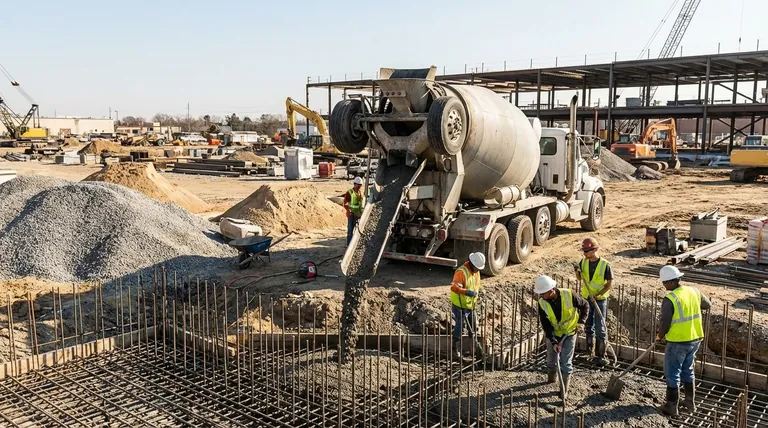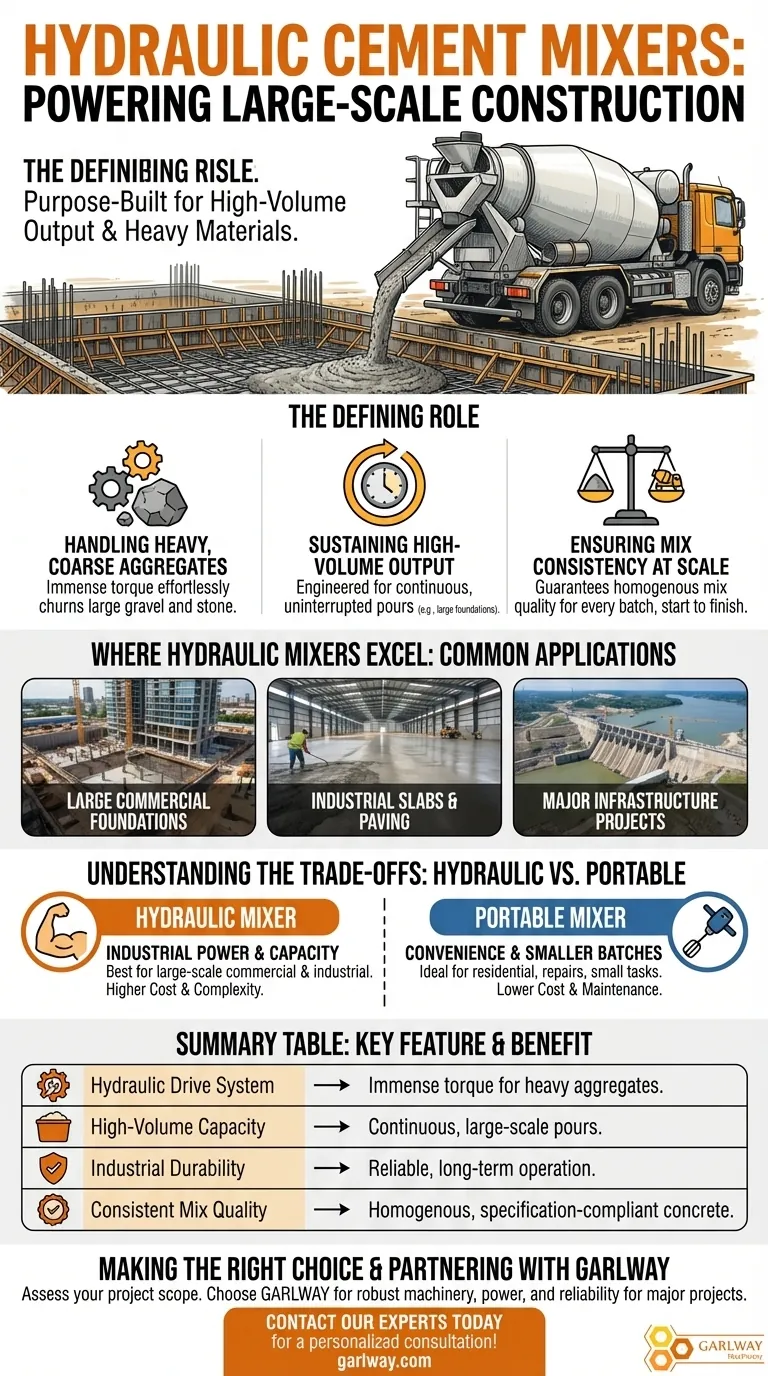Hydraulic cement mixers are purpose-built for large-scale construction projects that demand high-volume output and the power to handle heavy materials. Unlike smaller, portable mixers, their hydraulic systems provide the torque and durability needed for industrial applications where efficiency and consistency are paramount.
The decision to use a hydraulic cement mixer is driven by project scale. These machines are the industry standard for jobs requiring large, continuous concrete pours with heavy, coarse aggregate that would overwhelm smaller equipment.

The Defining Role of a Hydraulic Mixer
A hydraulic mixer's value comes from its ability to perform reliably under the demanding conditions of a major construction site. This capability is rooted in a few key principles of its design.
Handling Heavy, Coarse Aggregates
The hydraulic drive system generates immense torque. This allows it to effortlessly churn heavy and coarse materials, such as large gravel and stone, ensuring a homogenous mix without straining the motor.
Sustaining High-Volume Output
Hydraulic mixers are engineered for continuous operation. They are essential for projects like large foundations or structural slabs, where stopping a pour midway is not an option.
Ensuring Mix Consistency at Scale
For a large project, every batch of concrete must be consistent. The power of a hydraulic system guarantees that all ingredients are thoroughly integrated, producing high-quality, reliable concrete from start to finish.
Where Hydraulic Mixers Excel: Common Applications
The power and capacity of hydraulic mixers make them the default choice for specific, large-scale construction tasks.
Large Commercial Foundations
Pouring the foundation for a commercial building, warehouse, or high-rise requires a massive, uninterrupted supply of concrete, a task for which hydraulic mixers are perfectly suited.
Industrial Slabs and Paving
Projects such as warehouse floors, large driveways, and parking structures depend on the mixer's ability to efficiently produce vast quantities of concrete in a short amount of time.
Major Infrastructure Projects
The construction of bridges, dams, and other significant public works relies on the industrial-grade performance and reliability that only hydraulic systems can provide.
Understanding the Trade-offs: Hydraulic vs. Portable Mixers
Choosing the right mixer means understanding the distinct advantages and limitations of each type. While powerful, a hydraulic mixer is not the right tool for every job.
The Case for Portable Mixers
For smaller-scale work, a portable mixer is far more practical. These are ideal for residential sidewalks, small slabs, patching concrete, mixing mortar, or anchoring fence posts.
The Key Differentiator: Power and Capacity
The fundamental difference lies in the power source and batch size. A portable mixer is designed for convenience and smaller batches, while a hydraulic mixer is designed for raw power and industrial volume.
Cost and Complexity
Hydraulic systems are significantly more expensive, larger, and require more specialized maintenance. Their operational complexity and cost are only justified on projects large enough to leverage their power and efficiency.
Making the Right Choice for Your Project
Selecting the appropriate mixer comes down to a clear assessment of your project's scope and material requirements.
- If your primary focus is a large-scale commercial or industrial project: A hydraulic mixer is essential for its power to handle coarse aggregates and its capacity for high-volume, continuous pours.
- If your primary focus is residential work, repairs, or small-scale pours: A portable mixer provides the necessary functionality with far greater convenience and cost-effectiveness for tasks like small slabs or setting posts.
Ultimately, selecting the correct mixer is about matching the machine's core strengths to the specific demands of your job site.
Summary Table:
| Key Feature | Benefit for Your Project |
|---|---|
| Hydraulic Drive System | Provides immense torque to handle heavy, coarse aggregates without strain. |
| High-Volume Capacity | Enables continuous, large-scale pours for foundations and slabs. |
| Industrial Durability | Built for reliable, long-term operation on demanding job sites. |
| Consistent Mix Quality | Ensures every batch is homogenous and meets structural specifications. |
Ready to power your next large-scale project? Choosing the right equipment is critical to your project's success, efficiency, and budget. At GARLWAY, we specialize in robust construction machinery, including hydraulic cement mixers, winches, and concrete batching plants, designed for the demanding needs of construction companies and contractors globally. Our solutions are engineered to deliver the power, reliability, and volume you need to complete major commercial and industrial projects on time and to the highest standards.
Let's discuss how our machinery can bring value to your operations. Contact our experts today for a personalized consultation!
Visual Guide

Related Products
- Hydraulic Concrete Mixer Machine Cement Mixing Equipment for Mixture Concrete
- Portable Concrete Mixer Machine Equipment for Mixing Concrete
- JZC500 Large Cement Mixer Machine Price for Concrete Mix
- Commercial Electric Concrete Mixer Machine HZS 50 Small Batch Plant for Sale
- Ready Mixer Machine for Construction Ready Mix Machinery
People Also Ask
- How is cement discharged from the drum? The Simple Mechanics of Concrete Pouring
- What are the key features of a batch concrete mixer? Maximize Quality and Control
- What are important safety considerations when operating concrete mixer trucks? Build a Culture of Prevention
- Why are self-loading mixers suitable for remote construction sites? Achieve Total On-Site Concrete Independence
- What is a mortar mixer and what is its primary use? Master Masonry with the Right Equipment
- What safety features are included in self-loading concrete mixers? Ensuring Operator Protection and Site Stability
- What are the benefits of the mixing action in a Rotary Batch Mixer? Achieve Gentle, Uniform Blending
- What are the different types of discharging systems in a twin-shaft forced concrete mixer? Choose the Right System for Your Plant

















